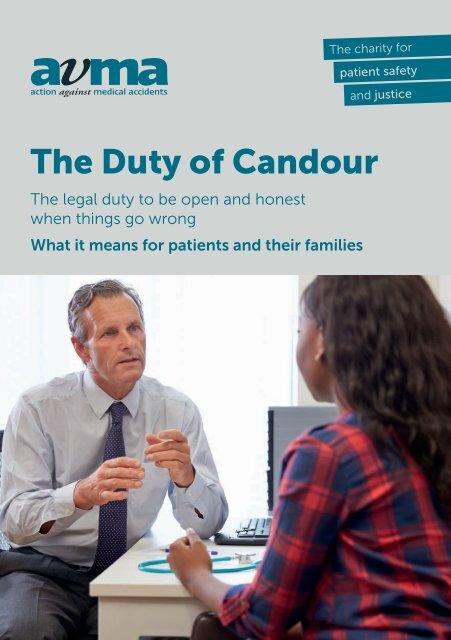The Duty of Candour
Duty-of-Candour-2016
Duty-of-Candour-2016
Create successful ePaper yourself
Turn your PDF publications into a flip-book with our unique Google optimized e-Paper software.
<strong>The</strong> charity for<br />
patient safety<br />
and justice<br />
<strong>The</strong> <strong>Duty</strong> <strong>of</strong> <strong>Candour</strong><br />
<strong>The</strong> legal duty to be open and honest<br />
when things go wrong<br />
What it means for patients and their families
<strong>The</strong> <strong>Duty</strong> <strong>of</strong> <strong>Candour</strong><br />
What it means for patients and their families<br />
THE DUTY OF CANDOUR is a statutory<br />
(legal) duty to be open and honest<br />
with patients (or ‘service users’), or<br />
their families, when something goes<br />
wrong that appears to have caused<br />
or could lead to significant harm in<br />
the future. It applies to all health and<br />
social care organisations registered<br />
with the regulator, the Care Quality<br />
Commission (CQC) in England.<br />
This leaflet explains what to expect<br />
if such an incident occurs and what<br />
to do if you think your healthcare<br />
provider has not complied with the<br />
duty <strong>of</strong> candour.<br />
What kind <strong>of</strong> incidents are<br />
covered by the duty <strong>of</strong> candour?<br />
<strong>The</strong> regulations for registration with<br />
the CQC place an over-arching<br />
responsibility on health and social<br />
care organisations to be open and<br />
transparent.<br />
<strong>The</strong> regulations define a ‘notifiable<br />
safety incident’ (e.g. an incident which<br />
must be notified to the patient or their<br />
representative), as ‘an unintended<br />
or unexpected incident… that could<br />
result in, or appears to have resulted<br />
in the death <strong>of</strong> a service user… or<br />
severe or moderate harm or prolonged<br />
psychological harm to the service user’.<br />
In other words, the organisation must<br />
tell you about any incident where<br />
the care or treatment may have gone<br />
wrong and appears to have caused<br />
significant harm, or has the potential to<br />
result in significant harm in the future.<br />
What can you expect when you<br />
are told about an incident?<br />
You should be informed about what<br />
happened as fully as possible and in a<br />
sensitive way, in person. This should<br />
happen as soon as reasonably practical<br />
after a notifiable safety incident in<br />
known about. This should also be<br />
followed up with a written account<br />
including an apology.<br />
You should be informed about what will<br />
happen next, for example what safety<br />
measures will be taken or what enquiries<br />
or investigation will be carried out.<br />
You should be told about where you<br />
can get support, such as counselling if<br />
appropriate, or independent advice (for<br />
example from Action against Medical<br />
Accidents – see back page for contact<br />
details).<br />
You should be kept informed about any<br />
investigation and its outcome.<br />
What about older incidents?<br />
<strong>The</strong> duty <strong>of</strong> candour regulations came<br />
into force in November 2014 for NHS<br />
bodies and April 2015 for all other<br />
organisations.<br />
If the incident occurred before the<br />
regulations came into force, the<br />
Learn more about the duty <strong>of</strong> candour and many other subjects at www.avma.org.uk/help-advice
CQC may not be able to take formal<br />
regulatory action or prosecute over a<br />
breach <strong>of</strong> the duty. However, they will<br />
take account <strong>of</strong> how organisations<br />
follow the spirit <strong>of</strong> the duty currently.<br />
<strong>The</strong> regulations do apply if the incident<br />
occurred after the regulations came in,<br />
but it is only realised later (for example,<br />
through a complaint investigation) that<br />
it met the definition <strong>of</strong> a ‘notifiable<br />
safety incident’.<br />
What you need to know<br />
THE DUTY COVERS any incident that<br />
appears to have caused, or has the<br />
potential to cause, significant harm<br />
ORGANISATIONS DON’T LEGALLY have<br />
to tell you about incidents that cause a<br />
‘low level <strong>of</strong> harm’ (e.g. minor or shortterm<br />
harm) or ‘near misses’ but it would<br />
be good practice if they did<br />
What if the organisation has<br />
not complied with the duty <strong>of</strong><br />
candour?<br />
If any organisation registered with the<br />
CQC fails to comply with the duty <strong>of</strong><br />
candour, they could face regulatory<br />
action from the CQC and, in the<br />
most serious or persistent cases, even<br />
criminal prosecution.<br />
If you think the organisation is in breach<br />
<strong>of</strong> the duty <strong>of</strong> candour, it is usually<br />
best to raise it with them first. This can<br />
either be with the health pr<strong>of</strong>essional<br />
with whom you have most contact, or<br />
by making a formal complaint.<br />
You can contact us at Action against<br />
Medical Accidents (AvMA – see back<br />
page for contact details). We will<br />
explain the procedures to you and <strong>of</strong>fer<br />
specialist independent advice.<br />
If you want us to, we can put you in<br />
contact with the CQC to let them know<br />
that there has been a breach <strong>of</strong> the<br />
duty <strong>of</strong> candour. You can also contact<br />
the CQC directly (see back page for<br />
contact details.<br />
THERE DOES NOT NEED to be certainty<br />
that an incident has caused significant<br />
harm – only that it appears that it has<br />
or may do so in the future<br />
INCIDENTS WILL BE COVERED if the<br />
‘reasonable opinion <strong>of</strong> a healthcare<br />
pr<strong>of</strong>essional’ would be that they did or<br />
could have caused significant harm<br />
THE EMPHASIS SHOULD BE on being<br />
open with you if there is any doubt<br />
AvMA CAN HELP YOU to understand<br />
your rights and advise you on what to<br />
do next. See our contact details on the<br />
back page to get in touch<br />
<strong>The</strong> CQC is not able to investigate<br />
every breach <strong>of</strong> the duty <strong>of</strong> candour.<br />
It is unlikely to take formal regulatory<br />
action or prosecute unless the breach<br />
is serious or widespread. However, the<br />
CQC will use feedback it receives to<br />
inform its monitoring and inspection <strong>of</strong><br />
registered providers.<br />
Learn more about the duty <strong>of</strong> candour and many other subjects at www.avma.org.uk/help-advice
Contact details<br />
Care Quality Commission<br />
(CQC)<br />
<strong>The</strong> CQC is the national regulator <strong>of</strong><br />
health and social care organisations<br />
in England and is responsible for<br />
monitoring compliance with standards<br />
such as the duty <strong>of</strong> candour.<br />
<strong>The</strong> CQC has legal powers to take<br />
action against organisations who do not<br />
comply.<br />
Tel: 03000 61 61 61<br />
www.cqc.org.uk<br />
You can find the full regulations<br />
themselves and the CQC guidance for<br />
organisations on how to comply at:<br />
Action against Medical Accidents<br />
(AvMA)<br />
AvMA is the charity for patient safety<br />
and justice. We provide free specialist<br />
advice and support to people when<br />
things go wrong in healthcare, and we<br />
are the charity which led the campaign<br />
to bring about the duty <strong>of</strong> candour.<br />
Helpline: 0845 123 2352<br />
(10am – 5pm Monday-Friday)<br />
Before contacting the helpline, please visit<br />
the help and advice section <strong>of</strong> our website<br />
for self-help information and leaflets.<br />
www.avma.org.uk/help-advice<br />
www.cqc.org.uk/content/regulation-<br />
20-duty-candour<br />
Action against Medical Accidents (AvMA)<br />
For advice and information<br />
Visit our website for a wide range <strong>of</strong><br />
advice, information and support, including:<br />
• making a complaint<br />
• inquest support<br />
• taking legal action<br />
www.avma.org.uk/help-advice<br />
Or call our helpline (10am – 5pm M-F)<br />
0845 123 2352<br />
Action against Medical Accidents<br />
Freedman House,<br />
Christopher Wren Yard<br />
117 High Street<br />
Croydon CR0 1QG<br />
020 8688 9555 (<strong>of</strong>fice)<br />
Please use the helpline number<br />
(left) for help or advice regarding<br />
a medical accident<br />
www.avma.org.uk<br />
www.facebook.com/AvMAuk<br />
@AvMAuk



